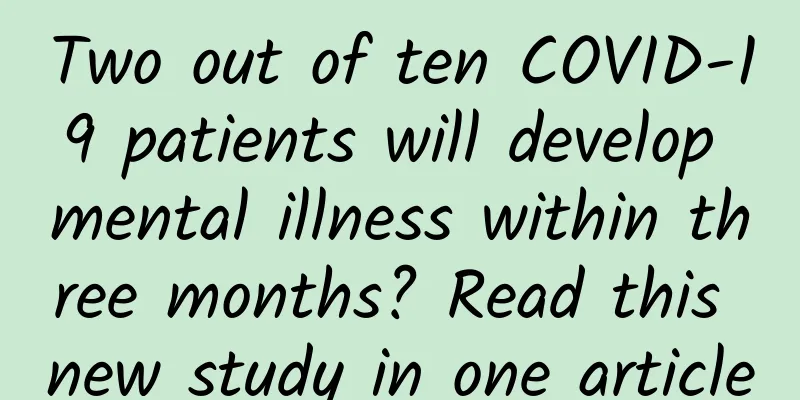Two out of ten COVID-19 patients will develop mental illness within three months? Read this new study in one article

|
Real points: The original study found that the main mental illness among COVID-19 patients was anxiety disorder. A certain proportion of people with other diseases also developed mental illnesses, and these diseases were also mainly anxiety disorders. Verified by: A piece of ginger | Research Associate Professor, Department of Pathology and Laboratory Medicine, University of Pennsylvania School of Medicine Recently, a piece of news has caused a lot of people to be nervous - a media report: "Research has found that 20% of COVID-19 patients will suffer from mental illness within 3 months." Can COVID-19 really cause people to suffer from mental illness, and is the probability so high? Let's start with this study. 1. Mental illness is not the same as mental illness When many people hear the word "mental illness", they immediately think of "mental illness" such as schizophrenia. Now the number of confirmed COVID-19 cases worldwide has exceeded 50 million. According to the 20% ratio, there are 10 million more mentally ill people. This sounds really scary! However, if you look closely at the relevant research, it is not that scary. A study on "20% of COVID-19 patients will develop mental illness within 3 months" was published in The Lancet Psychiatry on November 9, titled "Bidirectional associations between COVID-19 and psychiatric disorder: retrospective cohort studies of 62,354 COVID-19 cases in the USA." The study analyzed the electronic health records of 69 million Americans, including 62,000 patients with COVID-19, and found that mental illness is prone to occur among patients with COVID-19 - 18.1% of people were diagnosed with mental illness within 2 weeks to 3 months after testing positive for the new coronavirus, of which 5.8% were diagnosed with such illness for the first time. The mental illness here is not the same as what we understand as "psychotic disorder". Mental illness is actually a general term for a class of mental disorders. The study mainly mentioned three of them: mood disorder (a type of disease with severe mood changes, common symptoms include persistent sadness or emptiness, such as depression and bipolar disorder), anxiety disorder (a group of mental illnesses with excessive anxiety and fear, such as panic disorder and social anxiety disorder) and psychotic disorder (a serious mental disorder that causes abnormal thinking and perception, and the patient loses contact with reality, such as schizophrenia and paranoia). The mental illnesses related to COVID-19 are mainly the first two. For example, most people who develop mental illness for the first time after COVID-19 suffer from anxiety disorders, accounting for 81% of newly diagnosed people. Some suffer from mood disorders, accounting for 34%. Only a very small number suffer from mental illness (1.7%). How many COVID-19 patients will develop mental illness overall? According to the study's data, it is 0.9%, including first-time and recurrent symptoms. 2. Mental illness can also occur in patients with other diseases The sequelae of COVID-19 have always been a concern for everyone. Judging from the results of this study, although not all mental illnesses are mental illnesses, the onlookers also felt a chill: COVID-19 is really scary, and so many people have mental illnesses such as anxiety. Is COVID-19 so special? Is it the only one that can cause mental illness? No. In fact, this study not only analyzed COVID-19, but also analyzed the impact of other diseases such as influenza, other respiratory infections, skin infections, gallstones, urinary stones and large bone fractures on mental illness. The results found that for patients with these diseases, various mental illnesses will also occur within 14 to 90 days after diagnosis. The only difference is that the proportion of COVID-19 patients is a little higher. As mentioned above, 18.1% of COVID-19 patients were diagnosed with mental illness, while this number was 14.8% among skin infections and 15.1% among gallstone patients. Taking influenza as an example, among people with no history of mental illness, 2.8% will develop mental illness after being infected with influenza. Among patients with other respiratory infections, 3.4% will be diagnosed with mental illness for the first time. These newly emerging mental illnesses are also mainly anxiety disorders. Judging from the proportion of mental illness, the new coronavirus is just a large-scale influenza. In fact, this is relatively easy to understand. When you are sick, you will have some emotions and anxiety. In severe cases, you will develop anxiety disorders or emotional disorders. Even if the disease is cured, the troubles caused by the illness will take time to heal. 3. Many people already have a history of mental illness before being diagnosed with COVID-19 Some reports interpreted the results of the study as "20% of COVID-19 patients will develop mental illness within 3 months", which may mislead people to understand it as "they did not have mental illness before, but only developed it after being infected with COVID-19". In fact, most people who develop mental illness have a history of related diseases. As mentioned earlier, among all confirmed cases of mental illness after COVID-19, the proportion of first diagnosis was only 5.8%, and the rest were relapses. Therefore, it is very inaccurate to simply understand these mental illnesses as "new diseases caused by COVID-19" or "sequelae of COVID-19". COVID-19 may be the last straw that breaks the camel's back, causing mental illness to appear, or even leading to the recurrence of mental illness. It should also be pointed out that this study is a retrospective survey. Although the results can show that there is a correlation between COVID-19 infection and the occurrence of mental illness, it cannot show that there is a causal relationship between the two. The study also found that the proportion of people with a history of mental illness who are infected with COVID-19 is also relatively high. Obviously, it cannot be assumed that mental illness is the cause of COVID-19 infection. There are many reasons for COVID-19 infection. People with mental illness may have a higher chance of infection due to the need to go to the clinic for some treatment, or they may be affected by certain emotions and fail to protect themselves properly. To sum up, whether you are reading research or watching the news, you should not only look at the title, but also look at the specific content and interpret it correctly. Otherwise, you will develop a mental illness even if you do not have one. Editor of this article: ambergchen |
Recommend
How to remove the gauze after biopsy
For some patients with cervical erosion, puncture...
Can pregnant women eat shrimp?
Shrimp is indeed delicious. Although seafood may ...
What happens if the left ovary is not displayed?
Ladies, it is very important to have regular gyne...
Will sitting on a hot bench that someone else has sat on cause hemorrhoids, boils, or even STDs? Let's clarify once and for all →
During the morning and evening rush hours, when y...
What kind of underwear is better for sagging breasts?
Not only do sagging breasts look unsightly, but t...
What is the average height of girls in the south?
Height is a topic that people are very concerned ...
Drinking mung bean soup in late pregnancy to remove fetal toxins
We all know that fetal toxins refer to the toxins...
If you are pregnant, you can test it out in a few days.
Generally, the test can be detected about 2 weeks...
The pros and cons of eating shrimp for women
Shrimp is a food that many people like. It is ric...
Little Pomegranate Says Popular Science: Sweetness is in the “New”丨Korla Pears are ripe, eat this “treasure among pears” to relieve autumn dryness!
Your browser does not support the video tag In th...
What are the benefits of pelvic closure for women?
The female pelvis is a relatively important part ...
Can I get the HPV vaccine during my period?
The HPV vaccine is currently a very popular vacci...
How to maintain the uterus?
The female body structure is very complex. Becaus...
Can Chinese medicine treat premature ovarian failure?
Important reminder: The causes of premature ovari...









